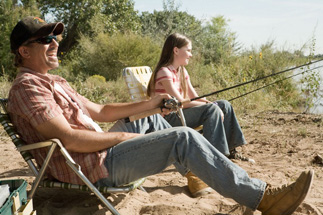Movie Review: Swing Vote
By Matthew Huntley
August 9, 2008
BoxOfficeProphets.com

That's not to say Swing Vote is an evil movie. In fact, some will argue it's nice and feel-goodish, but even nice and feel-good movies need to be interesting and take risks. This one doesn't. It's safe and traditional, and that's no compliment given our current political climate, where we crave something edgy and dynamic, not hackneyed and routine.
Kevin Costner stars as Bud Johnson, an uncouth and irresponsible trailer park dweller who works as a carton fastener at the local egg factory. He lives in Texico, New Mexico, a barren place made up of people who all know each other. There's not much to do here besides bowl or shoot pool. For the convenience of the screenplay, Texico is made into one of those typical movie towns where nothing ever seems to happen. Why? So something will.
The bright spot of the movie is Madeline Carroll as Bud's sharp and resourceful daughter named Molly. Molly is 12-years-old and calls her dad by his first name, caring for him like a mother and wife. She has to wake him everyday and says she'll leave him if he forgets to vote on election day. "It's your civic duty."
That same day, Bud loses his job and forgets to pick Molly up at the bingo hall. Molly decides to vote for him, but a power outage interrupts her and the voting machine resets, which means Bud's vote never counts. As luck would have it, the election is so close that it boils down to a single vote: Bud's.
Given the premise, it was obviously the movie's goal to deconstruct, satirize and parody America's political motif while at the same time send an encouraging message about hope, morals and the power one has to make a difference. The problem is, it doesn't do any of these things effectively. It's pretty much by the numbers and we're not surprised or intrigued by any of its developments. We feel like we've seen this movie before. It grows stale very quickly and we lose interest early on, so much that we don't even care whom Bud votes for.
The candidates are the incumbent Republican President, Andrew Boone (Kelsey Grammer), and Democratic hopeful Donald Greenleaf (Dennis Hopper), whose names sure sound like presidents. Each one has his own PR lackey who puts together a campaign to sway Bud to vote for their man. Boone's is Martin Fox (Stanley Tucci), who tells his people, "We're going to war." Fox has never lost an election, which isn't the same story for Greenleaf's advisor, Art Crumb (Nathan Lane), who's never won. But this information doesn't mean much to us since it doesn't result in anything interesting. I wanted an honest moment from one of these two men, but the movie doesn't give them one.
To buy Bud's vote, both parties resort to cheap tricks to get on his better side, like radically changing their stance on the environment, gay marriage and abortion. Such gags are too easy and predictable. The movie pretty much plays them straight, which makes it boring.
Chasing after Bud's story is the local newswoman, Kate Madison (Paula Patton), whom Molly trusts and believes has a good heart, but even her character feels artificial. The only genuine moment in the entire movie takes place when Molly visits her sick mom (Mare Winningham), who tells her "I'm not well." This is the only scene that showed signs of life and purpose. The movie suddenly changed its tone and became serious and effective.
Soon after, it returns to where it was and descends back into a false and idealistic political picture. The speech Bud gives at the end is more funny than emotional. By the time he gives it, we don't believe in or care about it because the movie has all but drained us of enthusiasm. And what he says doesn't really provide any answers or solutions anyway. The movie fails to make a memorable statement about...anything.
Comedies aren't really known for their style, but that's what Swing Vote needed. Director Joshua Michael Stern shoots only in static tripod shots (the exception being the scene with the mother) and John Debney's music feels repetitive and soporific. Nothing ever seems to fluctuate in this movie and it rides a dull tone. By the end, we don't care about Bud or his choice. We're just grateful Swing Vote finally ends.
My guess is the studio behind Swing Vote, Touchstone, knew they had a dud on their hands, which is why they scheduled it for an August release. This way, it would do what it could in theaters and be on DVD and Blu-ray by November 4th. It's sort of a last minute effort to cash in, and trust me, they'll need it.